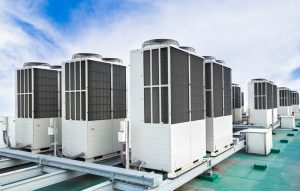The action movie hero is trapped in the building. He dashes out onto the roof, hoping to find a fire escape, but the bad guy is too close behind. The hero hides behind a rooftop HVAC unit. But why is it there? Why do commercial buildings have their HVAC units on their rooftops? It’s not just to make great movie sets. There are good reasons! We’ll explain. If you’d like to know more about rooftop units in Covington, LA, we’d love to chat with you.
History
Once upon a time, there was no such thing as air conditioning. Large buildings were heated with enormous steam boilers in the winter, and if they got too hot in the summer, well, that was just too bad for anyone in the building. When air conditioning was introduced, everyone wanted it. Especially in our climate, it made commercial buildings so much safer and more pleasant.
But the buildings were already there. And adding HVAC units indoors would have taken up so much of that valuable commercial square footage. Putting the units on top of the buildings was the only thing that made sense. And there were so many other benefits, it turned out to be the best solution, not just for retrofitting, but also for new construction.
Access
Being on top of the building, rooftop units are quite limited in who has access to them. For example, vandals would have an extremely difficult time getting to them to cause intentional damage. And automobiles, poorly parked beside the building, won’t be able to cause accidental damage to these units, either.
But when someone who is authorized to work on them needs access, it’s as easy as pie. Your HVAC technicians won’t be in the middle of your office, restaurant, or shop. They’ll be able to do the maintenance or repairs that your HVAC system requires while staying entirely out of the way, and they’ll have plenty of elbow room on all sides of the units to work.
Airflow
That elbow room has another benefit. Airflow makes a huge difference to how effectively and efficiently an HVAC unit can work. With space on all sides and air circulating all around, the rooftop is absolutely ideal for maximum airflow.
Noise
While modern HVAC units don’t make a ton of noise, they do make some. And if they’re inside the building, it will be clearly audible to everyone using the space. But on the roof, that sound can simply dissipate. It’s much quieter inside when the HVAC units are outside.
Flexibility
What if an addition needs to be built? What if a new sort of business is housed in your building, and it has greater HVAC needs? Another amazing thing about rooftop units is that they are modular! Instead of having to start from scratch and get a whole new HVAC system, increased needs can be easily addressed by connecting an additional modular unit to your system.


